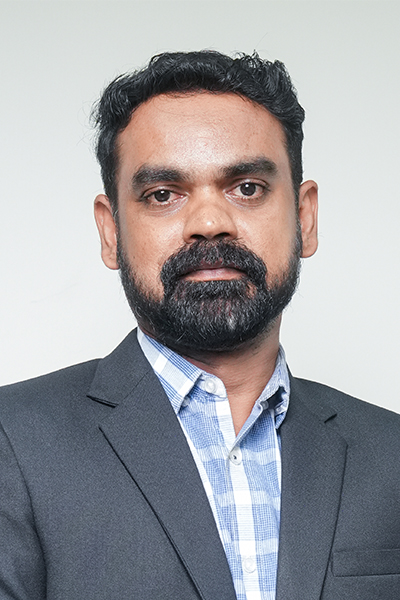Bio
Mr. K. Sathesh Kumar, M.Pharm., (Ph.D), is an esteemed Assistant Professor at the Sri Ramachandra Institute of Higher Education and Research. With domain expertise in collagen-based biomaterials, Mr. Sathesh Kumar has established himself as a significant contributor to the field through a decade of high-impact research and academic dedication. Although his date of birth is not provided, his professional and academic achievements speak volumes about his commitment to pharmaceutical sciences.
Academic and Professional Background:
Mr. Sathesh Kumar completed his Master of Pharmacy (M.Pharm) and is in the process of obtaining his Ph.D. His rigorous academic training has equipped him with a solid foundation in pharmaceutical chemistry and biomaterials, enabling him to embark on a prolific research career. As an Assistant Professor at Sri Ramachandra Institute, he is actively involved in teaching and mentoring students, guiding them through the complexities of pharmaceutical sciences.
Research Contributions:
Mr. Sathesh Kumar’s research primarily focuses on the development and application of collagen-based biomaterials, particularly in tissue engineering and wound healing. His scholarly contributions over the past decade include several high-impact publications that highlight his innovative approaches and technical expertise. Below are some key highlights of his research articles and their impact:
Collagen-Hydroxypropyl Methylcellulose Hybrid Scaffolds with Control Drug Release for Tissue Engineering:
Authors: Sathesh Kumar Kesavan, Deepa Selvaraj, Sathiamurthi Perumal, Arockiarajan Arunachalakasi, Nalini Ganesan, Senthil Kumar Chinnaiyan, Madhan Balaraman
Journal: Journal of Drug Delivery Science and Technology (2022)
Impact Factor: 3.981
Summary: This study explores hybrid scaffolds designed for controlled drug release, crucial for tissue engineering applications. The research highlights the potential of these scaffolds in enhancing tissue regeneration and drug delivery efficiency.
Formulation of a Thermo-Sensitive Hydro-Gel for Ulcerative Colitis Treatment:
Authors: Deepa Sathesh, K Sathesh Kumar, Velmurugan Devadasan, Sujatha Kuppusamy
Journal: Bioinformation 18(10): 925-937 (2022)
JCI: 0.31
Summary: This research formulates a hydrogel aimed at treating ulcerative colitis, demonstrating innovative therapeutic approaches. The thermo-sensitive hydrogel provides a novel method for drug delivery, improving patient compliance and treatment outcomes.
Ferulic Acid Loaded Microspheres Reinforced in 3D Hybrid Scaffold for Antimicrobial Wound Dressing:
Authors: Sivakumar S., Murali R., Arathanaikotti D., Gopinath A., Senthilkumar C., Kesavan S., Madhan B.
Journal: International Journal of Biological Macromolecules, 177 (2021)
Impact Factor: 8.87
Summary: This work investigates ferulic acid-loaded microspheres in hybrid scaffolds, focusing on their antimicrobial properties for wound dressing applications. The research underscores the significance of integrating antimicrobial agents into biomaterials to prevent infections and promote healing.
Fabrication of Hybrid Povidone-Iodine Impregnated Collagen-Hydroxypropyl Methylcellulose Composite Scaffolds for Wound-Healing Application:
Authors: Kumar Kesavan S., Selvaraj D., Perumal S., Arunachalakasi A., Ganesan N., Chinnaiyan S.K., Balaraman M.
Journal: Journal of Drug Delivery Science and Technology, 70 (2022)
Summary: The study discusses creating composite scaffolds with povidone-iodine for enhanced wound healing. These scaffolds offer a promising solution for improving wound care by combining the properties of collagen and povidone-iodine.
Recirculating Bioavailable Nicotine Metabolite Using Ascorbic Acid: A Pragmatic Approach for Treating Nicotine Dependence:
Authors: Arumugam M., Sundaram R.L., Jayajothi V., Arul M., Suresh J.A., Kesavan S.K.
Journal: Advances in Redox Research, 10 (2024)
Summary: This research explores a novel approach for treating nicotine dependence using bioavailable nicotine metabolites and ascorbic acid. The innovative method aims to reduce nicotine addiction by enhancing the bioavailability of its metabolites.
Professional Engagements and Experience
Mr. Sathesh Kumar has served as both principal investigator (PI) and co-investigator (Co-PI) in various funded research projects, reflecting his ability to lead and collaborate on complex scientific studies. One notable project includes:
Teaching and Mentorship
As an Assistant Professor, Mr. Sathesh Kumar is dedicated to imparting knowledge in pharmaceutical chemistry and biomaterials. He is deeply involved in mentoring students and guiding their research projects, helping them navigate the complexities of pharmaceutical sciences. His teaching philosophy emphasizes a thorough understanding of theoretical concepts coupled with practical applications, preparing students for successful careers in the pharmaceutical industry.
Mr. Sathesh Kumar handles a range of subjects, including Pharmaceutical Quality Assurance, Pharmaceutical Analysis, and various Pharmaceutical Chemistry courses at both the undergraduate and postgraduate levels. His technical skills are complemented by his proficiency in software tools such as molecular modeling (GOLD GLIDE, Schrödinger, Autodock) and toxicity prediction, which he leverages to enhance his research outputs and provide students with a comprehensive learning experience.
Conclusion
Mr. K. Sathesh Kumar is a distinguished researcher and educator in the field of collagen-based biomaterials. His contributions to the scientific community through innovative research, impactful publications, and dedicated mentorship have significantly advanced the field of pharmaceutical sciences. Mr. Sathesh Kumar’s work continues to influence and enhance the development and application of biomaterials, particularly in tissue engineering and wound healing. His commitment to translating research into practical solutions and his dedication to teaching and mentoring the next generation of pharmaceutical scientists make him a respected figure in his domain.

